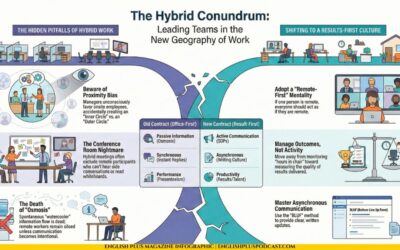- Why Should You Care?
- Key Takeaways
- Keywords
- Frequently Asked Questions
- How does adaptive leadership differ from traditional leadership models?
- Can adaptive leadership be learned or is it an inherent trait?
- Is adaptive leadership effective in all types of organizations?
- How does one measure the success of adaptive leadership?
- What role does communication play in adaptive leadership?
- Myth Buster
- Myth: Adaptive leadership is only for senior management.
- Myth: Adaptive leadership eliminates the need for traditional management skills.
- Myth: Quick decision-making is not compatible with adaptive leadership.
- Myth: Adaptive leadership is too risky for stable organizations.
- Myth: Adaptive leadership focuses only on the short term.
- Let’s Talk
In an ever-evolving world, the ability to lead through change and uncertainty is not just a skill, but a necessity. Adaptive leadership, a concept pioneered by Ronald Heifetz and Marty Linsky at Harvard University, offers a framework for navigating through the complex and often turbulent waters of change in any organization or team setting.
Imagine you’re captaining a ship in uncharted waters. Just like the sea, the business world is constantly changing, presenting new challenges and opportunities. Adaptive leadership is about understanding these dynamics, being agile in response, and guiding your team effectively through them.
At its core, adaptive leadership is about embracing change, not as a threat, but as an opportunity for growth. It requires a leader to step back, assess the situation, and encourage creativity and problem-solving within their team. This approach differs from technical leadership, which relies on existing know-how and expertise to solve problems. Adaptive challenges, on the other hand, are those without clear solutions, requiring leaders and their teams to venture into unknown territory.
One real-life example is the shift many companies faced during the global pandemic. Traditional business models were upended, and leaders had to adapt quickly. Those who embraced adaptive leadership facilitated their teams in finding innovative ways to work remotely, pivot business strategies, and maintain customer engagement, proving the efficacy of this leadership style.
Adaptive leadership also involves regulating distress. Change can be uncomfortable and disorienting for teams. Effective adaptive leaders recognize this and help their team members navigate through their discomfort, turning it into a constructive force for innovation and growth. A great example is the tech industry, where rapid innovation often leads to frequent changes in job roles and project scopes. Leaders in this sector excel in adaptive leadership by maintaining team morale and fostering a culture of continuous learning and flexibility.
Another key element of adaptive leadership is maintaining disciplined attention. In a world full of distractions and constant change, it’s easy for teams to lose focus. Adaptive leaders keep their teams aligned on their goals, ensuring that everyone understands their role in the bigger picture. For instance, during a company merger, leaders must help their teams understand new dynamics and keep them focused on the integration process, preventing productivity loss and cultural clashes.
Moreover, adaptive leadership is not just about leading others; it’s about empowering them. It involves delegating authority and encouraging team members to take ownership of their roles. This approach fosters a sense of responsibility and promotes a more dynamic and flexible team structure.
In conclusion, adaptive leadership is an essential skill in today’s fast-paced and ever-changing world. It’s about understanding that change is inevitable and learning to harness it for growth and innovation. As a leader, embrace this approach to inspire and guide your team through uncertainties.
Thank you for tuning in to this discussion on adaptive leadership. If you found this insightful, consider sharing it with your colleagues and friends. For those looking to delve deeper and support the creation of more content like this, join us on Patreon. Your support helps us continue to explore and share valuable insights in leadership and beyond.
Why Should You Care?
Understanding adaptive leadership is crucial in today’s ever-changing environment. It equips you with the tools to navigate through uncertainty and change, not just in business but in various aspects of life. By learning about adaptive leadership, you gain insights into managing teams, embracing change positively, and fostering an environment of continuous growth and innovation. This knowledge is valuable for anyone in a leadership role or aspiring to be in one, as it prepares you to handle complex challenges effectively.
Key Takeaways
- Embracing Change: Adaptive leadership is about seeing change as an opportunity, not a threat.
- Problem-Solving: It involves encouraging creativity in finding solutions to unprecedented challenges.
- Regulating Distress: Effective adaptive leaders help their team manage discomfort and use it constructively.
- Maintaining Focus: Keeping the team aligned with goals amidst distractions and changes is crucial.
- Empowering Teams: Delegating authority and fostering a sense of responsibility in team members.
- Agility: The ability to quickly adapt to new situations and challenges.
- Continuous Learning: Promoting a culture of learning and flexibility.
- Cultural Adaptability: Understanding and integrating into new dynamics, especially during major organizational changes like mergers.
- Innovation: Utilizing change as a driving force for innovative thinking and solutions.
- Leadership Development: The concept emphasizes personal growth as a leader in handling complex situations.
Keywords
- Adaptive Leadership: A leadership approach focusing on guiding and encouraging teams through change and uncertainty.
- Regulating Distress: The ability of a leader to help team members manage and utilize discomfort for positive outcomes.
- Disciplined Attention: Keeping the team focused and aligned with their goals amid distractions.
- Empowerment: Giving team members authority and responsibility, enhancing their sense of ownership.
- Agility: The capability to move quickly and easily in response to change.
- Innovation: The act of introducing new ideas or methods.
- Continuous Learning: The ongoing process of developing new skills and knowledge.
- Cultural Adaptability: The ability to adjust and integrate into new team dynamics or organizational cultures.
- Team Morale: The overall mood, attitude, and satisfaction of a team.
- Uncertainty: The state of being uncertain or unsure about the future or outcomes.
Frequently Asked Questions
How does adaptive leadership differ from traditional leadership models?
Adaptive leadership differs by focusing on guiding teams through uncertain and changing environments, rather than relying solely on established methods and expertise. It emphasizes flexibility, empowerment, and the ability to respond to unprecedented challenges.
Can adaptive leadership be learned or is it an inherent trait?
Adaptive leadership can be learned. While some people may naturally possess traits that align with adaptive leadership, the skills and approaches can be developed through practice, experience, and education.
Is adaptive leadership effective in all types of organizations?
Yes, adaptive leadership is versatile and effective across various types of organizations. Its principles of flexibility, innovation, and responsiveness to change are universally applicable.
How does one measure the success of adaptive leadership?
Success can be measured by the team’s ability to effectively navigate through change, the level of innovation and problem-solving skills displayed, and overall team performance and morale during periods of uncertainty.
What role does communication play in adaptive leadership?
Communication is key in adaptive leadership. It involves not only conveying ideas and changes clearly but also listening to team feedback, encouraging open dialogue, and ensuring that everyone understands and is aligned with the goals.
Myth Buster
Myth: Adaptive leadership is only for senior management.
Reality: Adaptive leadership can be practiced at all levels of an organization, not just by senior management.
Myth: Adaptive leadership eliminates the need for traditional management skills.
Reality: Adaptive leadership complements, rather than replaces, traditional management skills. It adds a layer of flexibility and responsiveness.
Myth: Quick decision-making is not compatible with adaptive leadership.
Reality: Adaptive leadership involves making informed decisions quickly in response to changing scenarios.
Myth: Adaptive leadership is too risky for stable organizations.
Reality: Even stable organizations face unforeseen challenges, and adaptive leadership prepares them to handle these effectively.
Myth: Adaptive leadership focuses only on the short term.
Reality: While adaptive leadership is responsive to immediate changes, it also involves long-term strategic thinking and planning.
Let’s Talk
- How can adaptive leadership be implemented in your current team or organization?
- Can you think of a situation where adaptive leadership would have made a difference in your experience?
- How does the concept of regulating distress resonate with you in your professional life?
- Do you believe adaptive leadership skills can be beneficial in personal life scenarios? If so, how?
We would love to hear your thoughts and experiences regarding adaptive leadership. Feel free to share your opinions and stories in the comment section. Your insights could be invaluable to others exploring this dynamic leadership style!










0 Comments